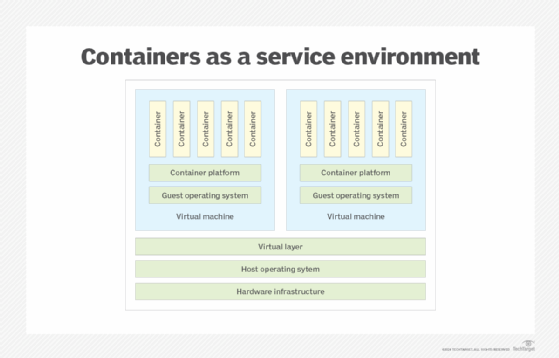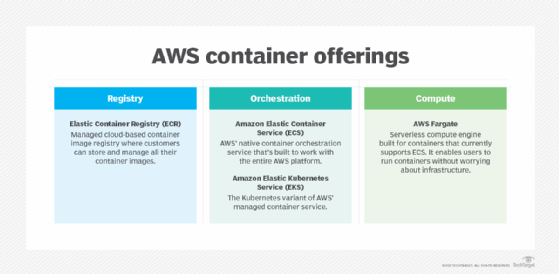containers as a service (CaaS)
What is containers as a service (CaaS)?
Containers as a service (CaaS) is a cloud-based service that provides a secure environment for running containerized applications. Software developers and IT administrators can upload, start, stop, remove, scale, and in other ways control their container deployments without needing to manage the underlying infrastructure or wait for infrastructure to be deployed.
CaaS providers ensure that development and ops teams have the resources they need, when they need them, so they can focus on the development itself and on other initiatives. The services also come with centralized web portals, application programming interfaces (APIs), and other tools that help customers easily interface with their CaaS environments in order to manage their deployments and automate their operations.
Within the spectrum of cloud computing services, CaaS falls somewhere between infrastructure as a service (IaaS) and platform as a service (PaaS), although CaaS is usually positioned as a subset of IaaS. The basic resource for CaaS is the container, rather than a virtual machine (VM) or bare-metal host system, which are traditionally used to support IaaS environments.
Figure 1 provides a conceptual overview of a typical CaaS environment. The provider hosts the environment on a hardware infrastructure with each server running its own operating system and virtualization software. The virtualization layer hosts one or more virtual machines, which in turn host one or more containers, often many more than what Figure 1 depicts.

Each virtual machine maintains its own instance of the container platform. The platform, as it is shown in Figure 1, is represented in the broadest sense and can incorporate a wide range of services and technologies, such as Docker, Kubernetes, or proprietary systems.
Regardless of how the platform is implemented, it provides the tools necessary for easily orchestrating, automating, and managing the containers during their lifespans. The platform might also include the ability to store and distribute container images. Because CaaS is such a complete offering, customers can deploy their containers to the platform, without concern about the underlying infrastructure or future scaling requirements.
CaaS Benefits
Many organizations now use containers for their applications because they provide the advantages of virtualization without the overhead of virtual machines. When compared to traditional apps, containers can make it easier for development teams to build, test and deploy their apps. Development teams can also distribute and scale containerized apps faster and more easily.
However, building and maintaining an environment for deploying containers can require a significant investment in resources and time. For this reason, many organizations are turning to CaaS, which offers several important benefits:
- Customers pay only for the resources they use, such as compute instances, load balancing services or scheduling capabilities.
- Development teams can easily manage and scale their container deployments, often with the ability to automate operations and support infrastructure as code (IaC) deployments.
- CaaS providers ensure that their services are responsive, secure and stable, freeing up IT teams to focus on more strategic or innovative efforts.
- Developers can quickly deploy their containers, without needing to wait for the infrastructure to be put into place, resulting in faster development and testing cycles.
Most of these benefits are specific to CaaS offerings that come from public cloud providers. However, IT teams can also implement private clouds that support CaaS capabilities. In this case, the team is responsible for deploying and maintaining the infrastructure, which adds to the overhead and increases complexity. However, this approach also provides an organization with more control over its container environment.
CaaS Providers
Several public cloud providers now include CaaS as part of their service portfolios. For example, Google offers Google Kubernetes Engine (GKE); Amazon provides Elastic Container Service (ECS), Elastic Kubernetes Service (EKS) and AWS Fargate; and Microsoft has Azure Container Apps, Azure Container Instances, Azure Kubernetes Service and Azure Red Hat OpenShift, which is a joint venture between Red Hat and Microsoft. Container services are also available from other providers as well, such as IBM's Cloud Kubernetes ServiceRed Hat OpenShift and Oracle's Container Engine for Kubernetes (OKE).
The key difference between CaaS offerings is primarily the container platform, which handles a wide range of operations, including container deployment and orchestration, cluster management, scaling, reporting and lifecycle management. CaaS providers use a variety of platforms and technologies, such as Docker, Kubernetes, Docker Swarm, and Apache Mesos. CaaS offerings can also differ in the level of services they provide. For example, Amazon ECS customers must manage their own EC2 instances. With AWS Fargate, however, Amazon manages the underlying instances. Figure 2 offers more detail on the AWS offerings.

CaaS Security
Major cloud providers recognize the importance of protecting their customers' assets and take many precautions to safeguard these environments. Even so, providers still differ in terms of how they protect the container environments. An organization that is shopping for a CaaS provider should carefully assess the service to ensure that it provides adequate protections for the entire environment.
Although the CaaS provider manages the container environment, customers should still follow best practices to ensure maximum security. For example, ECS customers should audit changes to their EC2 instances to make certain all modifications have been authorized. In addition, development teams should include only the required components in their containers, and IT should leverage the service's available security features, such as security groups, network access control lists and subnet route table rules.
Learn more about cloud containers and how do they work. See how to choose the right serverless container service for your organization and how the major cloud providers take their swing at this class of service. Explore the key similarities and differences between PaaS and containers.







